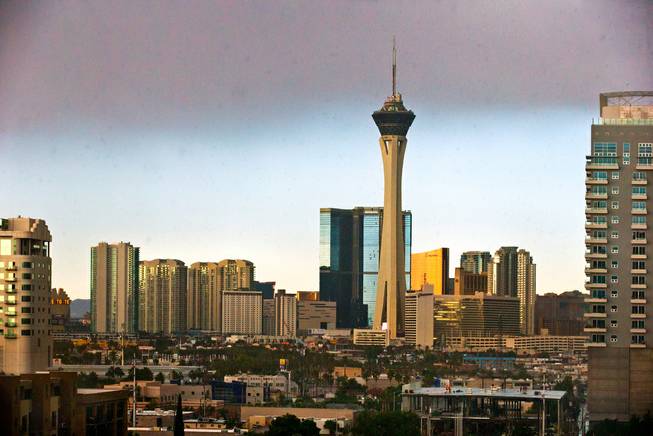
A view of the Stratosphere on a stormy day in May 2016. The iconic Las Vegas property was recently sold to Golden Entertainment.
Tuesday, June 13, 2017 | 2 a.m.
Related Coverage
A trend toward consolidation on the Las Vegas Strip, with fewer companies owning more casinos, appears to aptly describe the locals market after Monday’s announcement that Golden Entertainment is buying American Casino Entertainment Properties.
The sale of American — which owns the Stratosphere, Arizona Charlie’s Decatur, Arizona Charlie’s Boulder and the Aquarius Casino in Laughlin — to Golden is expected to be completed by the end of the year, pending regulatory approval. The four properties extend Golden’s portfolio, which now includes three casinos in Pahrump and 50 taverns, as well as slot routes in Nevada and Montana and a casino in Maryland.
The deal is just the latest example of how gaming companies are expanding in the locals market by purchasing other properties, as opposed to building new ones.
“Consolidation in gaming, broadly, has been happening over the past 10-15 years in a bigger sort of way in the regional and Las Vegas Strip side,” said Alex Bumazhny, a gaming industry analyst and senior director for Fitch Ratings. “And in the last years, we’re seeing it more rapidly on the locals side as well.”
Four properties in the Southern Nevada locals market have recently changed hands.
In December, Boyd Gaming purchased Aliante Station and earlier in the fall, it bought the Eastside Cannery on Boulder Highway and the Cannery casino in North Las Vegas.
Also last fall, Station Casinos completed its purchase of the Palms, which at times has appealed to locals and tourists alike, on Flamingo Road just west of the Las Vegas Strip.
And just last month, SLS, while not strictly a locals casino, announced it had agreed to be purchased by Alex Meruelo and Meruelo Group, owners of the Grand Sierra Resort in Reno.
In Golden’s case, one analyst says, buying American makes sense because of Golden’s experience in other aspects of gaming.
“Golden’s core competency is already the Las Vegas locals through its distributed gaming slot machines and taverns,” said John DeCree, a gaming analyst with Union Gaming.
Consolidation has been the trend, DeCree says, because casino companies benefit from the economies of scale after the purchases.
“We’re seeing a continued consolidation across all regional gaming,” DeCree said. “That’s just driven by the efficiencies of scale and synergies it produces. The more properties you can own and greater scales you have, the better and more efficient it is.”
So what other companies are looking to buy their way into a larger share of the market?
There are a number of potential players, analysts say. Even some who are smaller may step up and surprise people, the way the Golden/America deal surprised some observers.
“It’s hard to speculate,” Bumazhny said. “Every time I think the wave of mergers and acquisitions is over, someone pops out of the woodwork. Golden was not really in the woodwork, but it is sort of a smaller company. I don’t really know in full detail what is still out there or what the next target could be. But one company that came out of bankruptcy and has reduced leverage is Affinity Gaming.
Affinity Gaming was created from the post-bankruptcy reorganization of Herbst Gaming. Affinity was purchased by private equity firm Z Capital. Affinity owns Silver Sevens in Las Vegas and the Primm Valley Resort, Whiskey Pete’s and Buffalo Bill’s in Primm Nevada as well as a casino in Sparks, and three in Colorado, two in Missouri and one in Iowa.
DeCree also said he didn’t expect Golden to take “a bite this size,” and that Affinity could be a company that might be looking to expand by purchasing a locals resort. The question is which one.
“They could be the next one,” he said. “They have a decent-size portfolio both in Nevada as well as a couple properties out of state.”
Bumazhny said he thinks new acquisitions will likely be made by gaming companies specifically looking to expand their gaming footprint, as opposed to companies simply looking to add another asset to their portfolio.
“That seems to be something that’s winning the day in terms of who comes out on top of bidding for Las Vegas assets,” Bumazhny said. “Even going back to when the M Resort was acquired by Penn versus anyone nonstrategic such as a real estate investment trust or a private equity firm.”
CORRECTION: An earlier version of this story incorrectly reported the Southern Nevada city in which Golden Entertainment owns three casinos. The correct city is Pahrump. | (June 13, 2017)

Join the Discussion:
Check this out for a full explanation of our conversion to the LiveFyre commenting system and instructions on how to sign up for an account.
Full comments policy